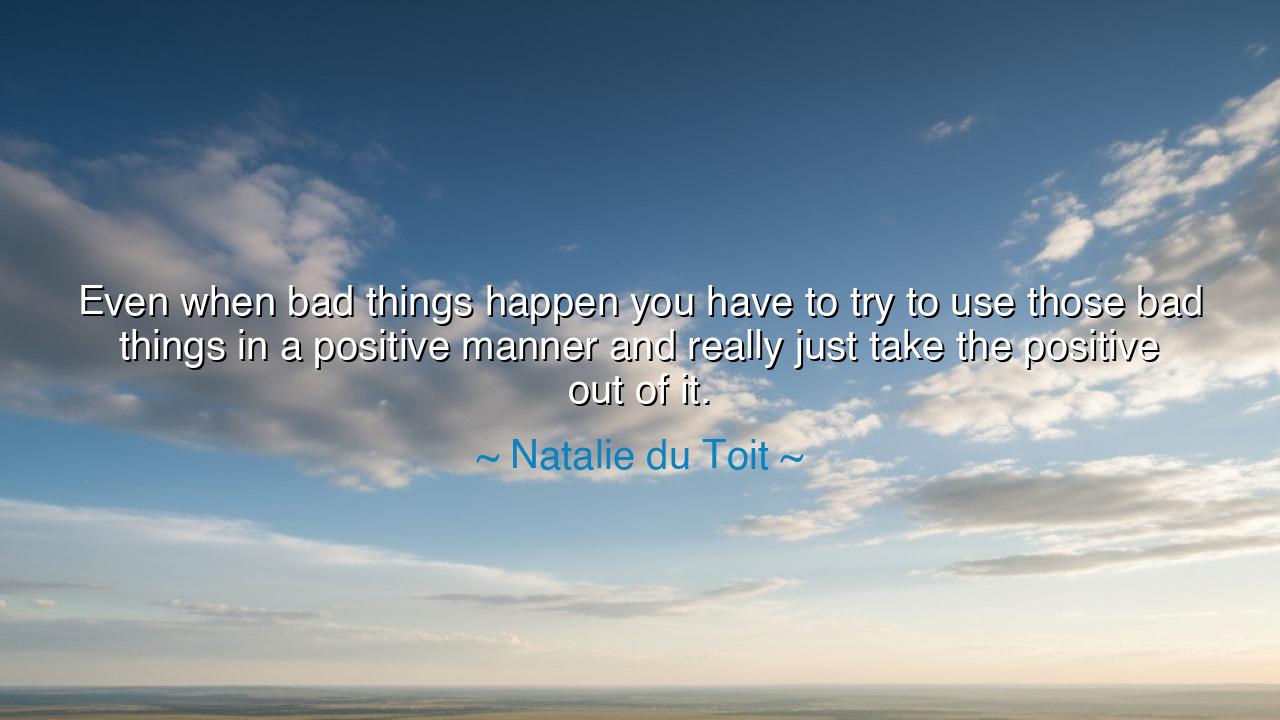
Even when bad things happen you have to try to use those bad
Even when bad things happen you have to try to use those bad things in a positive manner and really just take the positive out of it.






Hear, O seekers of courage, the words of Natalie du Toit, the swimmer who conquered both the waters of the earth and the storms of fate: “Even when bad things happen you have to try to use those bad things in a positive manner and really just take the positive out of it.” These words rise not from idle thought, but from a life tested by trial. For she, who lost her leg in a tragic accident, chose not despair but perseverance, not bitterness but triumph. Her voice carries the weight of experience: that sorrow can be transformed, pain can be a teacher, and misfortune can be the seed of greatness.
The meaning of her teaching is this: life will bring suffering. No man, no woman, no child walks the earth without tasting bitterness. Yet the true difference between the broken and the victorious lies in response. The broken curse fate and lie defeated. The victorious ask: “What can I learn? What can I build from this ruin?” To use the bad things in a positive manner is to take the very weapon that struck you and forge it into your shield, to let adversity become the raw material of your strength.
The origin of these words lies in du Toit’s own journey. As a young athlete in South Africa, her dream was to compete in the Olympics. But fate struck her down in a motorcycle accident, leaving her with the loss of her left leg. Many would have abandoned the waters, surrendering their dream. But du Toit chose otherwise. She returned to swimming, training harder than before, and not only competed but triumphed, becoming the first amputee to qualify for the Olympic Games. Her life embodies her words: from tragedy she drew power, from loss she carved victory.
Consider also the story of Abraham Lincoln, who suffered defeat after defeat—failed businesses, failed elections, personal losses that crushed his heart. Yet from each failure he extracted a lesson, a new resilience, a sharper wisdom. When he finally rose to the presidency, it was these scars that shaped him, giving him the endurance to guide a nation through civil war. The very bad things that might have destroyed another became for him the tools of greatness.
Mark this well, children of tomorrow: you cannot control what calamities befall you, but you can always control what you take from them. To find the positive in the storm does not mean denying the pain; it means refusing to let the pain be wasted. Every sorrow can deepen your compassion, every failure can sharpen your skill, every loss can increase your strength. The choice is yours—whether to be consumed by the fire, or to rise from it tempered like steel.
Practical wisdom says: when hardship comes, ask yourself not, “Why me?” but, “How may I grow from this?” Write down the lesson, however small. Speak of your struggle, for in sharing it you may inspire another soul. Channel your grief into labor, your anger into courage, your doubt into determination. This is the alchemy of life: transforming the heavy lead of sorrow into the shining gold of resilience.
Therefore, remember du Toit’s words: “Even when bad things happen… take the positive out of it.” Live by this creed, and you will never be defeated, even in defeat. For the one who knows how to turn wounds into wisdom, and setbacks into stepping-stones, cannot be broken by the blows of fate. Such a person rises again and again, until at last their very life becomes a beacon for others, proof that even tragedy can be made to serve the purposes of greatness.
––






QHHa quang hung
This perspective encourages resilience, but I wonder about cultural and social influences. Do people from different backgrounds interpret and apply the idea of taking positives from negatives differently? I’d like to explore how environment, upbringing, and community support impact the ability to transform adverse situations into growth opportunities.
DTPham Dinh Thien
I find this statement motivating, yet it raises questions about fairness and control. What if bad things happen that are largely outside one’s influence—how do you maintain positivity without blaming yourself or oversimplifying complex circumstances? I’d like to explore strategies for fostering a proactive mindset even when outcomes feel unjust or unpredictable.
PBLong Nguyen Phuc Bao
This quote makes me think about the emotional aspect of dealing with setbacks. How does one remain positive without suppressing emotions like grief, anger, or disappointment? I’d like to explore methods for transforming negative experiences into lessons or motivation while maintaining authenticity and emotional health.
GDGold D.dragon
I’m intrigued by the idea of extracting value from negative experiences. Does focusing on what can be learned or gained help in personal growth and motivation? I’d like to understand whether this mindset is innate, learned, or developed over time through repeated exposure to adversity, and how it shapes one’s approach to future challenges.
DGduc giap
This raises questions about the balance between optimism and realism. Can constantly looking for the positive in bad situations ever backfire, causing denial or avoidance of important issues? I’m curious how one can differentiate between productive reframing and minimizing the seriousness of the problem, and what tools or practices support healthy reflection.